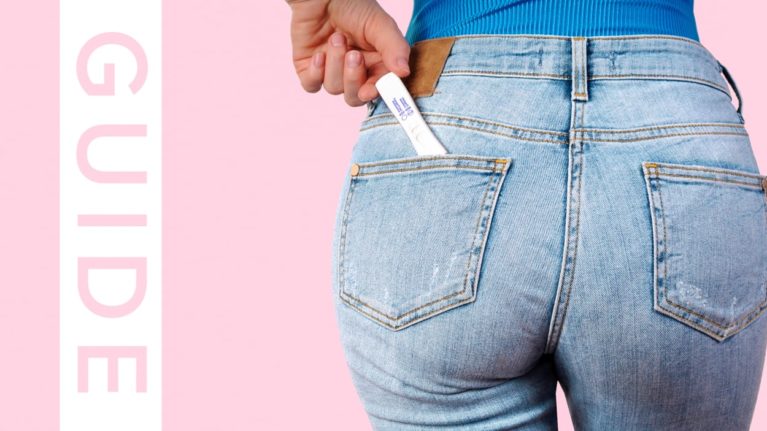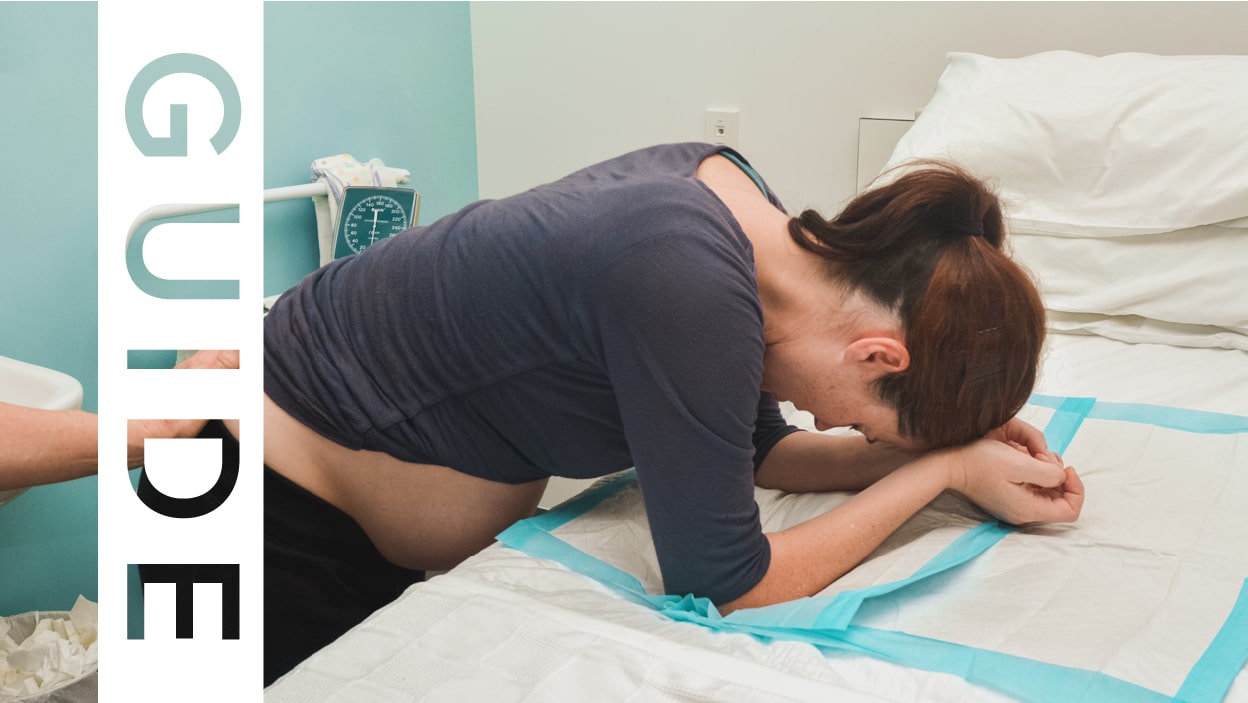

Approved by the What’s Up Moms Medical Advisory Board
So you want to make a baby? We totally endorse that decision and welcome you into our cult! Hopefully you learned enough in eighth grade health class to understand the most basic basics of how to get pregnant, but there’s still plenty you can do to prepare your body, and optimize your, uh, trying time.
Speaking of trying, we realize there are a variety of ways to put a bun in that oven — THANK YOU, SCIENCE! — but since we’re not doctors, we’re sticking to what we know best: the old-fashioned way (hello, eggplant emoji!). That said, there are still some helpful tips in here for anyone who is trying to get pregnant, no matter the method.
Before You Start Trying, Stop Doing This Stuff…
There are all kinds of delicious/fun yet not-so-healthy things you’ll need to give up once you become pregnant (some of which you’d be better off quitting even sooner). But there are also a few things you absolutely need to give up ahead time if you want to get pregnant.
- Birth Control Okay, this one might be obvious, but if you want to get pregnant, you need to stop whatever form of birth control you’re on. Quit taking your pill, or have your IUD removed, whatever.
- Cigarettes Do you smoke?! We’re not judging you (okay, maybe just a little). But if you’re a smoker who wants to get pregnant, quit sooner than later. Quitting cigarettes is hard, and pregnancy is hard, and you don’t want to be dealing with both at the same time.
- Accutane While there are plenty of prescription drugs that are unsafe for pregnancy, the acne drug Accutane is known to cause serious birth defects. So if you’re currently taking it, stop immediately, then wait a full cycle to ensure it’s completely out of your system before trying to conceive.
…And Start Doing These Things
- Having Sex. Unless science is helping your process along, abstinence does not a baby make. So hop in the sack, and have some fun. Sometimes trying-to-get-pregnant sex isn’t the most exciting sex in the world, so if you’re in a dry spell, or aren’t having regular, frequent sex with your partner, have just-because sex to start getting into the habit. Every other day is what’s often advised. Of course, there are only a few days per month that you’re actually fertile, which is one of the reasons you should start…
- …Tracking Your Period. If you’re not already tracking your cycle, now’s a good time to start. We’ll get into the nitty gritty of this later, but whether you’re jotting down the dates in a notebook, or tracking every cramp in an app, noting the first and last day of every period is kind of important to this whole process.
- Taking Prenatal Vitamins. It’s recommended that women take a prenatal vitamin before getting pregnant. These supplements can be found at a variety of price points, but they should all have folic acid, which can prevent neural tube defects like spina bifida.
Go See Your OB (if you have one)
While it’s not necessary for most women, some people like to see an obstetrician/gynecologist before trying to conceive. The doc can check to make sure everything is in working order, answer any questions you might have, recommend supplements, and more.
What’s that? You don’t have an OBGYN? Then who’s been doing your annual exams, young lady?? Hmmmmmm? It’s cool. If you don’t have any medical concerns and you’re ready to start trying, go ahead, you don’t need an OBGYN lined up in advance. But start the process of finding one by asking your mom friends and/or your primary care doc for their recs, or check with your insurance provider for in-network physicians.
A few things to keep in mind when picking an OB:
- This person is going to be all up in your business — especially in the late stages of pregnancy — so make sure it’s someone who makes you feel comfortable.
- In the last few months of pregnancy, you’ll be going to see your doctor a lot. Like you’ll see her face more than you’ll see your own feet or shave your legs. So if at all possible, try to choose a practice that’s close to home.
- If the doctor is part of a private practice (as opposed to a hospital system), ask what hospital privileges he or she has, and make sure your insurance will cover delivery there.
Make Your Health a Priority
“Be healthier” is such a nebulous recommendation, especially because the changes required to make that happen look different for everyone. But if you’re trying to get pregnant, there are some things you can do to set the stage for a healthy pregnancy.
- Sleep. Sleep allows your body to recover and recharge from the day, so do what you can to get a good night’s sleep while you’re trying to conceive.
- Hydration. Water is important to just about every function of your body, so if you’re not drinking enough of it (and let’s be honest, you’re probably not), get yourself a cute water bottle and drink up!
- Diet. Food is the fuel that keeps your body going. So if you’re only feeding it bagels and burgers, it’s not going to run as well as it would on less processed foods — and we’re trying to get it to run really well here! Focus on lean proteins, whole grains, good fats (think nuts and avocado), and lots of fruits and veggies. Even if you’re not ready to convert to a diet of grilled chicken breast and broccoli, at the very least, limit your intake of anything with trans fats (chips, fast food, etc.) or tons of sugar (note: sugar is often hidden inside “healthy” foods like yogurt and cereal). Basically: the less processed the better. And if you eat a lot of fish, try to avoid high-mercury varieties like tuna and swordfish to avoid a build up in your system.
- Booze & Caffeine. Some women choose to cut out alcohol and caffeine completely when trying to conceive. While there’s not a ton of conclusive research on the effects of moderate consumption of either on fertility, most experts (and, you know, common sense) will tell you that binge drinking lattes or Long Island Iced Teas on the reg isn’t healthy for you or your reproductive system.
- Exercise. Physical activity is always a good thing, but it’s especially helpful when you’re trying to get pregnant. In addition to increasing muscle tone and flexibility, which can make pregnancy and childbirth more comfortable, regular exercise can increase your libido. Win-win! If you don’t know where to begin, start small with daily walks or yoga classes, and work your way up. Most pregnant women are cleared by their doctors to continue whatever physical fitness they were doing before pregnancy, so now is a perfect time to start making it a part of your routine.
All of that said, don’t go on any crazy diets or start exercising three hours a day out of the blue. Extreme changes can affect your cycle — making it hard to determine your most fertile times — so make baby steps (!) toward a healthier lifestyle. And if you’re unsure about anything, talk to your doctor.
Understanding Your Cycle
Remember when we told you to track your period? That’s because it can help you figure out your most fertile days. Plus, when you do get a positive pregnancy test, the first day of your last period will determine your due date. While every woman’s body is different, if your cycle is regular, here’s what happens:
- Length Most women have a cycle that’s 28 to 35 days, but certain factors — like health, stress, and quitting birth control — can temporarily throw that off. The first day of your period is considered the start of a new cycle.
- Ovulation When an egg is released from your ovaries, you’re ovulating. Yay! That happens in the middle of your cycle (whenever that is for you), and you’ll be most fertile the two or three days leading up to ovulation, and on the day of ovulation itself. This is your “fertile window.”
- Conception If you get the timing right and the sperm and egg meet up, you’ve conceived! Yay!
- Implantation About 10 days after ovulation (give or take, because of course), a fertilized egg will implant into the uterus. Then you’re pregnant! (Except technically you already were because the first day of this lucky cycle is considered the first day of the pregnancy). A few days after implantation, you may be able to get a positive pregnancy test, but the longer you wait, the more likely it is to be accurate.
Tracking Ovulation
Tracking your period is pretty easy. Figuring out the precise date of ovulation is a little trickier, but not impossible. There are a couple ways to get a beat on it.
- Calendar/Apps. Logging the dates of your period is the easiest way to track your cycle. If you put in the first and last day of your period, an app will do the math to determine your probable ovulation date. The drawback is that you may not ovulate the same day every month, and these apps rely on collective data to determine your fertile window — though many let you track other symptoms, like cervical mucus, temperature, etc. to help get a more exact date. If you’re really committed to this whole thing, you might even try using a few different apps for the first couple of months to see if they match up.
- Basal Body Temperature. Taking your basal (resting) body temp (BBT) at the same time every morning has long been used as a form of “natural” family planning. An increase in BBT can indicate ovulation. TBH, it’s kind of a drag and you have to do it before you even get out of bed, but some people swear by it.
- Cervical Mucus. If you’re fascinated by bodily fluids (and if not, get used to it anyway because babies are fluid factories) keeping track of your cervical mucus could be a great way to pinpoint ovulation. During your fertile window your cervical mucus takes on the consistency of raw egg whites.
- Ovulation Tests. Ovulation tests work like at home-pregnancy tests (yep, you pee on a stick), except instead of measuring for pregnancy hormones, its looking for ovulation hormones.
Sexy Time
Once you’ve nailed down your ovulation, set aside some time to actually do the deed. You don’t need to cancel all your plans or anything, though. Having sex every other day leading up to ovulation should be plenty – but certainly don’t let us stop you from having more!
Happy baby-making!







